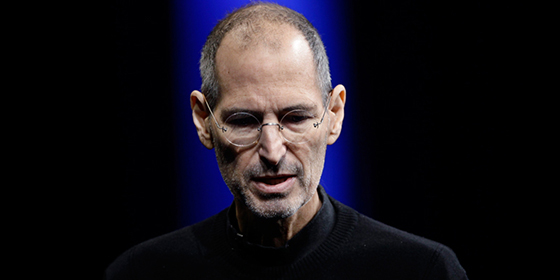It says a lot about Steve Jobs that his resignation from Apple has sent waves throughout the worlds of technology and entertainment.
As one of the key players in the computer revolution of the last forty years, he has played an instrumental role in how we use technical devices, listen to music and watch entertainment.
His first period at Apple (1976-1985) saw him co-found a company which helped introduce the idea of graphics based computing into the mainstream.
The three-part PBS documentary Triumph of the Nerds: The Rise of Accidental Empires (1996) gives some background to the revolutionary industry of which Apple was a part:
After being fired by the man he hired to run the company, he founded NeXT, a company which aimed to produce workstations for businesses and higher education.
This demo video featuring Jobs from 1987 shows how it pioneered many things we now take for granted:
Most significantly, a NeXT Computer was used by Tim Berners-Lee in the early 1990s to create the first web browser and web server.
Around the same then bought part of the computer division of Lucasfilm and relaunched it as Pixar in 1986.
One of the most significant entertainment companies to emerge in the modern era, they used computers to make animated blockbusters such as Toy Story (1995) and Finding Nemo (2003).
In 1996 Jobs and John Lasseter described the history of Pixar on the Charlie Rose show and what they were trying to do with the company:
This profile of Jobs from the same year focuses on his career up to that point and features a particularly obnoxious news presenter (note the key quote from Jobs when he says: “Apple still has a future”):
After paying Lucas $5m for it in the mid 1980s, he eventually sold it to Disney for $7.4 billion after an unprecedented run of critical and commercial hits.
This alone would have made him a key figure in the entertainment and technology worlds, but in 1997 he made a dramatic return to Apple, which was then in dire trouble.
Restoring the core computing products to their former glories he made bold moves into the music and film industries with the iTunes store, revolutionised how we listen to music with the iPod and reshaped mobile computing with the iPhone and iPad.
Since 2005, Apple’s revenues have grown enormously, to the point where this month it surpassed oil giant Exxon Mobil as the most valuable company in the world.
In recent years health issues have cast a shadow over Jobs, as he survived pancreatic cancer in 2004 and a liver transplant in 2009.
After his first bout of cancer he gave this memorable commencement speech to Stanford University in 2005:
In January of this year he embarked on an extended leave of absence, despite making key public announcements and being involved in key strategic decisions.
His last public appearence was this proposal to his local city council for a new Apple Campus on Tuesday, June 7th:
When the news was announced earlier today about Jobs resigning, it made headlines around the world.
> Steve Jobs at Wikipedia
> Details on the forthcoming authorised biography of Jobs
> Bloomberg video profile of Jobs (48 mins)
